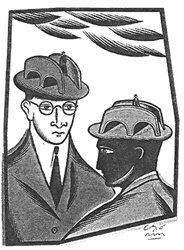View on Home Country
By Christof Wackernagel
WHEN Kafka met Brecht They didn't know what to talk about. They were
sitting in one of the NASA control rooms in Housten and views of Prague
were flickering on all the TV screens in obviously artificial colors.
Kafka thought of narrow streets and fleeting glances from women he would
never have the courage to address; ha was convinced it would make no sense
to talk Brecht about his melancholy. They drank coffee from standardized
plastic cups that had been served casually by a tanned, muscular college
student. In the corner, a child was earnestly playing with a small toy
robot. Brecht, desperatelv at a loss for words, wished Beckett were there,
thinking he might be able to overcome the embarrassment of the situation.
Or Richard Hülsenbeck or Hans Arp, he thought; anyone who won't keep
rminding me that I will never succeed in producing such anguish. Kafka
thought to himself that Brecht probably despised him because he was apolitical:
I can't help it he thought, desperately, and yearned for the noncommittal
darkness of a theater where, sitting alone in the last row, he could watch
the dress rehearsal of a play in which beautiful women, enacting tragic
scenarios, would have to die senselessly.
Brecht was suddenly unable to concentrate. His thoughts were a chaos af
sentence fragments, and he caught himself wondering wether this was actually
all a dream. This was nonsense, of course, for they were walking across
an utterly real wooden bridge in an English landscape of hte early 19th
century. Kafka, in a chatty tone, was talking about the romance of a little
boy and a little girl who lived on opposite of the bridge, but who were
not allowed to speak to
one other because there parents were mortal enemies. But Brecht was unintrested
aspacially since he was thinking intensely about Stalin; indeed, he was
obstinately hauntedby the idea that you can't make an omeletwithout breaking
some eggs. But Brecht felt the idea was far too flat and banal for such
a historic figure as Stalin. He grew irritated. The harder he tried to
shake off that thougt, the more vehemently it obsessed him. Nor could
he endure Kafka's chitchat, which, he suddenly realized to his great astonishment
, he hadn't been able to understand for some time. The sensitive Kafka
noticed this, of course, and, deeply offended, lapsed into silence. All
at once, both of them felt as if they had been marking time for an eterni
in the middle of the bridge; they had been changing the entire world around
them, but not moving from the spot themselves. " The blue rider,"
joked Kafka weakly, when they saw the misshapen, somewhat unicorn-like
donkey that kept Stalin in check. But Brecht did not find this at all
funny. And thus it was that two masters found no language with which to
communicate with one another.
The preceding is exerpted from Nadja:
Erzählungen und Fragmente (Nadja: Storeies and Fragments), 1985
|
